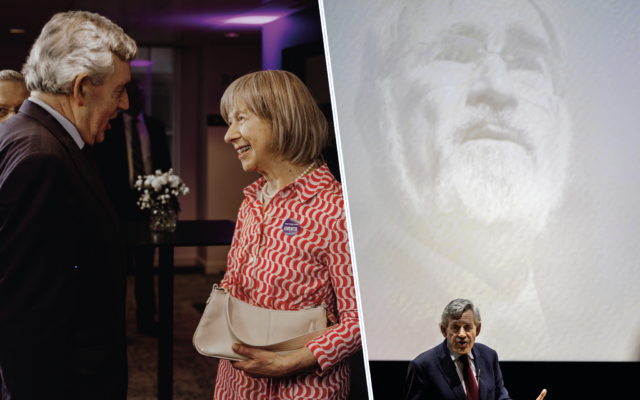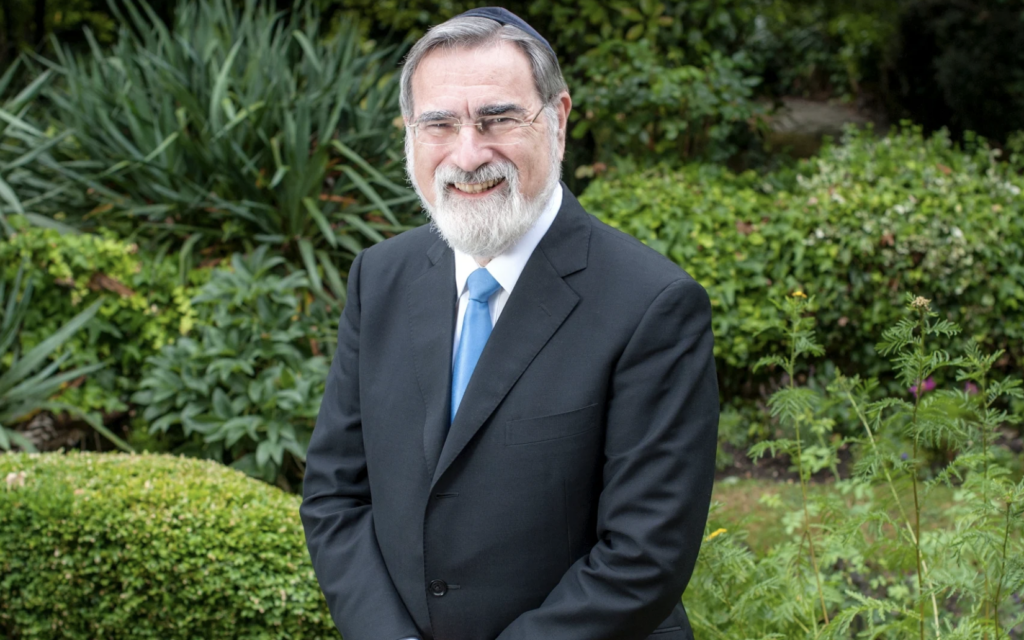Gordon Brown draws on close friendship with Rabbi Sacks in inaugural legacy lecture
Taking the theme Hope, Faith and Charity, the former prime minister uses the teachings of the late Chief Rabbi to put forward the idea that we can create a new age of hope

The former prime minister Gordon Brown drew on his close friendship with Rabbi Lord Sacks when he delivered the inaugural lecture aimed at keeping alive the legacy and teachings of the former Chief Rabbi.
Brown recalled in his talk on Wednesday being asked to write a foreword to a reprint of Jonathan Sacks’ book The Politics of Hope, and being so thrilled to be asked and so keen to do a good job that he worked on it even on his honeymoon. Then chancellor of the exchequer, he wanted to do justice to the earlier edition of the book. “I think I spent more time doing that than I spent on the budget that year,” he joked.
Rabbi Sacks died in November 2020. In his 22 years in the role of Chief Rabbi he became a global religious leader. As a philosopher and award-winning author, his was a respected moral voice. He was the laureate of the 2016 Templeton Prize in recognition of his “exceptional contributions to affirming life’s spiritual dimension” and was described by King Charles III, with whom he also had a warm friendship, as “a light unto this nation”.
His friendship with Brown had contributed to the sometimes light-hearted tone of the memorial lecture. The former Labour politician recalled: “Jonathan said to me one day, ‘I have one piece of advice for you: humour. Your speeches need humour. You’ve got to tell stories.”
Brown, who was chancellor 1997-2007 and prime minister 2007-10, spoke of how Rabbi Sacks’ thought and writings had been a huge influence on him. He also spoke of the importance of morality to the politics and development of this country, and of the transformative power of hope. “Hope is more than optimism. It is not an expectation but an intention to do things,” Brown said. “A feeling that it can and will be done.”
Hope, along with faith and charity, were the themes of his hour-long lecture, organised by the Rabbi Sacks Legacy and delivered on a stage at King’s College London without notes, or the protection of a lectern.
Earlier, Brown recalled the financial crisis of 2008-09, a point when he said he relied on Rabbi Sacks, “because I understood, as he understood, that this was not simply a financial crisis. This was a moral crisis. Bankers had awarded themselves bonuses they didn’t deserve, had taken risks they didn’t understand and people were buying goods they couldn’t afford.”
In April 2009, he gave a speech at St Paul’s Cathedral, the first speech in that church by a serving prime minister. “I’ll be honest,” Brown told his audience on Wednesday. “It was written mostly by Jonathan. I can acknowledge that now.”

He said: “When I was in government, working with the King of Saudi Arabia and the prime minister of Israel, working with other people, we could see the way the problems that existed could in future be solved.” In what appeared to be a reference to the current crisis in Israel and Gaza, he added: “There is a way forward, and I believe it is still possible, and we must never lose hope. Because hope is the starting point of everything that Jonathan Sacks wrote about.”
Brown thought Rabbi Sacks had three principles he wanted us to follow. The first was to think of society as a common home that we build together. Britain is not a hotel or a country house, but a home where each of us has rights and responsibilities. The second is to think of Britain and a society: not as a contract but as a covenant built on values and beliefs that are shared. The third is the principle of partnership, where state, the market and communities work together. “Jonathan talks about a partnership where the whole is bound to be greater than the sum of the parts.”
Everybody needed be involved if the problem of broken communities and broken families was to be solved, he said. The same went for the problem of integrating communities, the environment and violent extremism. But the biggest problem now, Brown said, was poverty, with up to six million children in this country going without basic necessities. “How can children have an equal access to hope, how can they realise their potential if they’re living in homes without kitchens and bedrooms with beds? There is desperation in towns and villages that ‘levelling up’ has passed by.”
Brown said charities helping people in need were themselves struggling. “Jonathan said we are stronger when we care for the weak, we are richer when we care for the poor, we are invulnerable when we care for the vulnerable.”
Brown spoke of the importance of philanthropy, which formed part of the idea of all of us doing something together. “I would like to take out of the memory of Jonathan Sacks that we have a new age of hope, that it is based on responsibilities and rights, that it is based on getting people equal access to hope, and it is based on his groundbreaking work on how we can partner together to make a better society, recognising the sheer power of social conscience and what it can achieve.”
Elliott Goldstein, chair of the Rabbi Sacks Legacy, thanked the speaker and said: “It is our hope that this annual lecture will continue to amplify Rabbi Lord Sacks’ role as a moral voice in our society, particularly in these difficult times.”

Thank you for helping to make Jewish News the leading source of news and opinion for the UK Jewish community. Today we're asking for your invaluable help to continue putting our community first in everything we do.
For as little as £5 a month you can help sustain the vital work we do in celebrating and standing up for Jewish life in Britain.
Jewish News holds our community together and keeps us connected. Like a synagogue, it’s where people turn to feel part of something bigger. It also proudly shows the rest of Britain the vibrancy and rich culture of modern Jewish life.
You can make a quick and easy one-off or monthly contribution of £5, £10, £20 or any other sum you’re comfortable with.
100% of your donation will help us continue celebrating our community, in all its dynamic diversity...
Engaging
Being a community platform means so much more than producing a newspaper and website. One of our proudest roles is media partnering with our invaluable charities to amplify the outstanding work they do to help us all.
Celebrating
There’s no shortage of oys in the world but Jewish News takes every opportunity to celebrate the joys too, through projects like Night of Heroes, 40 Under 40 and other compelling countdowns that make the community kvell with pride.
Pioneering
In the first collaboration between media outlets from different faiths, Jewish News worked with British Muslim TV and Church Times to produce a list of young activists leading the way on interfaith understanding.
Campaigning
Royal Mail issued a stamp honouring Holocaust hero Sir Nicholas Winton after a Jewish News campaign attracted more than 100,000 backers. Jewish Newsalso produces special editions of the paper highlighting pressing issues including mental health and Holocaust remembrance.
Easy access
In an age when news is readily accessible, Jewish News provides high-quality content free online and offline, removing any financial barriers to connecting people.
Voice of our community to wider society
The Jewish News team regularly appears on TV, radio and on the pages of the national press to comment on stories about the Jewish community. Easy access to the paper on the streets of London also means Jewish News provides an invaluable window into the community for the country at large.
We hope you agree all this is worth preserving.





















